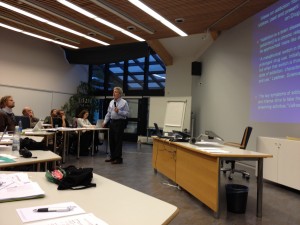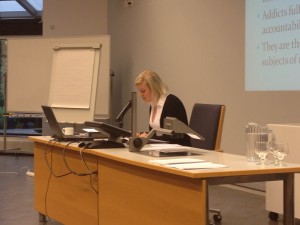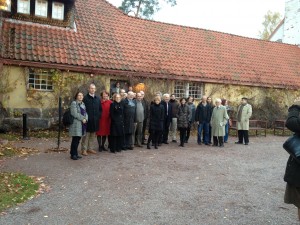A group of international scholars are meeting in Espoo, Finland 15-18.10.2014, taking the first step in the work with a new book that gathers knowledge on gambling policy and prevention.
Two new IMAGES dissertation
Michael Egerer defended his dissertation Institutional footprints in the addiction image: A focus-group study with Finnish and French general practitioners and social workers from University of Helsinki 12th of September 2014. Opponent was Geoffrey Hunt.
Tanja Hirschovits-Gerz at Tampere University is defending her dissertation”Suomalaisten riippuvuuksia koskevat mielikuvat” [Finnish people’s images of addiction] on September the 6th. Opponent was Pekka Hakkarainen, THL.
Pekka Sulkunen received Academy grant funding

Professor Pekka Sulkunen has been granted 600 000 euro from the Academy of Finland for a comparative research project that focuses on the use of public funds collected from gambling activities. The project will compare different systems, justification discourses and the negative social implications of gambling.
Research will be carried out in five European countries: Finland, Sweden, Norway, France and Italy.
Continue reading “Pekka Sulkunen received Academy grant funding”
Thomas Babor – visiting researcher at the CEACG
During the past two weeks Thomas Babor has been a visiting scholar at the CEACG. The reason for his visit in Helsinki this time is a collaborative book on gambling policy which he is planning and organizing with CEACG’s researchers.
Continue reading “Thomas Babor – visiting researcher at the CEACG”
Grants for CEACG researchers
CEACG-researchers Arto Ruuska and Michael Egerer have received scholarships from the Finnish Foundation for Alcohol Studies.
M.Soc.Sci. Arto Ruuska received a grant for his post-doc work
“From dietetic prudence to clinical and social studies of alcohol misuse: Alcohol-related phenomena in European medical thought, c. 1790–1851”
M. Soc. Sc. Michael Egerer received funding from the Gambling Studies fund for the project
“Problem gambling: Explaining, assigning responsibility and harm. General practitioners’ and social workers’ perspective”
Call for abstracts: Club Health San Francisco 2013
Call for abstracts: closing date 11 January 2013
The 8th International Conference on Nightlife, Substance Use and Related Health Issues
May 28-30, 2013, San Francisco
Do you have research, policy initiatives or practical experience that can show others from around the world how to make promote and protect health in nightlife environments? If so, please submit an abstract. To submit an abstract, register to attend and find out more, please visit: www.clubhealthsf2013.org<http://www.clubhealthsf2013.org>
Club Health San Francisco 2013 is organized by the Centre for Public Health, Liverpool John Moores University, UK in partnership with DanceSafe, Drug Policy Alliance, San Francisco Department of Public Health, Better World Advertising, California Music and Culture Association and the San Francisco Entertainment Commission.
Anna Petran — CEACG:s guest researcher autumn 2012
Anna Petran, a junior research fellow at the Gender Initiativkolleg (GIK) “Gender, Violence and Agency in the Era of Globalization” (University of Vienna, Austria), visited the CEACG for a 3 month period during this autumn.
In her doctoral dissertation Petran examines the phenomenon of binge drinking as a body based adolescent self-practice at the turn of the twentieth century. The background of her research is the medial and political discussion about the drinking behavior of German teenagers:
“In 2007 a 16-years-old student died after consuming 45 shots of Tequila and accusations of who was to blame for the excessive drinking of German teenagers started to appear in media and political speech”, explains Petran.
Petran wants to make sociological inquiries into the ways in which contemporary health discourses in the public discussion can be seen in this context: “What really interests me is how we can discern a changed societal perception of bodily practices”, she explains. According to Petran a paradox is that the new social relevance of the body and its management seems to stimulate the teenager’s drinking practices, too.
“The first results of my fieldwork with excessively drinking teenagers point out that boys and girls practice binge drinking as a bodily performance of power and autonomy as well as a form of an emotional self-management. With a special focus on gender my particular interest applies this, apparently paradox and societal undesirable, relation between an overall body discourse and one concrete practice. For sociology, the study of binge drinking promises enlightening views on present practices of collectivization and individualization of young people.”
How, then, did you find working at the UofH, and CEACG?
“Joining the CEACG was a very special experience for me. By working with international specialists in a very welcoming and friendly environment I got a deep insight in my research field and learned a lot beside my original academic context. I appreciate very much the inspiring working atmosphere, the high academic standard and the infrastructure at the University of Helsinki.”
Petran adds that she enjoyed Helsinki as a modern and clean city with pleasant people.
“Thanks to the great housing opportunities the University provides for international researchers I could enjoy life in the heart of the city. On long walks at the weekends I explored Helsinki’s natural environment and get the pleasure of a Finnish autumn which, in my point of view, is most beautiful.”
We wish Anna good luck with her very interesting work and hope she will stay in touch with the CEACG.
Majvik meeting: Will there ever be a unified concept of addiction?
The CEACGarranged the conference “Addiction: What’s the added value of the concept today?” in Majvik, Finland, October 15th-17th 2012. The meeting gathered researchers from different disciplines and traditions in order to discuss the ways in which the phenomenon can be understood in view of the knowledge available. What does the concept of addiction contribute with? Why is it useful or insufficient?
Throughout the conference the discussion was lively and many different aspects were pondered. Historical, popular, philosophical, sociological, political, neurobiological and cultural aspects of the phenomenon were mixed in the program sessions so that the different perspectives would be represented throughout the discussions. The meeting programme can be viewed here.
Gene Heyman (picture below) held one of the introductory keynote speeches, in which he pointed out what is known about choice in addictive behaviour and about making decisions to quit. How does the disease model’s use of the concept fit with this knowledge? View Heyman’s power point presentation here.
Philosophical discussions on the concept touched upon similar aspects. Finnish philosopher Susanne Uusitalo (pictured below) pointed out the importance of a moral accountability model in the context of recovery.
What is the limitation of neuroscientific knowledge of addiction processes, and which type of contributions does brain research offer the field of addiction research and practice? This question was critically discussed both by neuroscientist Esa Korpi and professor Harold Kalant. See the latter presentation here.
For people interested in the papers and presentations from the meeting, they are available in a password protected area of this web page. Please, contact Matilda Hellman (matilda.hellman@helsinki.fi) in case you are interested in viewing them.
The meeting was a thematic meeting of the Kettil Bruun Society. These meetings are small parallel tracks to the yearly conference event, typically initiated by society members. The meeting was sponsored by the Helsinki Collegium for Advanced Studies, The Federation of Finnish Learned Societies, the Finnish Foundation for Alcohol Studies and Nordic Centre for Welfare and Social Issues (Alcohol and drug research unit)
The participants of the conference are planning a thematic publication (thematic journal issue) on the basis of the presentations and papers of the meeting.
Two new grants for CEACG research
Starting September 2012 the CEACG will receive three year Academy funding for a project that compares Italian and Finnish adolescents’ alcohol drinking images. Prime investigator is Anu Katainen.
A new project that begins at the same time concerns how addicted online role gamers experience deviancy in terms of spatial, temporal and corporeal dimensions. The aim is to develope a framework for a social geography of addictions. Prime investigator is Matilda Hellman.
EATING: COMPARATIVE PERSPECTIVES
A Colloquium at the Helsinki Collegium for Advanced Studies
Helsinki, May 23-25 2012
The “Eating: Comparative Perspectives” -symposium is organized by Professor Alan Warde as part of the Jane and Aatos Erkko Professorship activities. The symposium takes place on 23-25 May at HCAS. Please find the programme of the symposium below.
Background: The social science of food and eating remains very fragmented and is much stronger in its understanding of production than consumption. Recent developments in food studies have been driven less by the logic of theoretical inquiry than by a mission to respond to public crises and anxieties —physical, social and moral, symbolic, and economic. Eating is a matter that concerns everybody; in most instances a mundane and repetitive activity, it fulfils a range of social functions which far transcend the satisfaction of physiological need. This colloquium will take stock of the current state of social scientific knowledge about eating, with particular emphasis on sociological analysis. It seeks to explore the potential for new developments in theory and theoretical approaches, with a view to making better sense of the now considerable amount of primary research data on eating patterns. In particular it will focus on the way that the use of comparative methodologies might contribute to theoretical advances. Papers will draw upon comparisons of various kinds and levels – between historical periods, countries, regions, classes, ethnic groups, etc..
How such studies might be brought to bear upon different traditions of theory and whether comparative analysis might support new research programmes in the sociology of eating will be explored.
Provisional Programme (subject to change)
Venue: Helsinki Collegium for Advanced Studies, Fabianinkatu 24, except public lecture which will be held in the lecture hall 12 of the University main building, Fabianinkatu 33.




